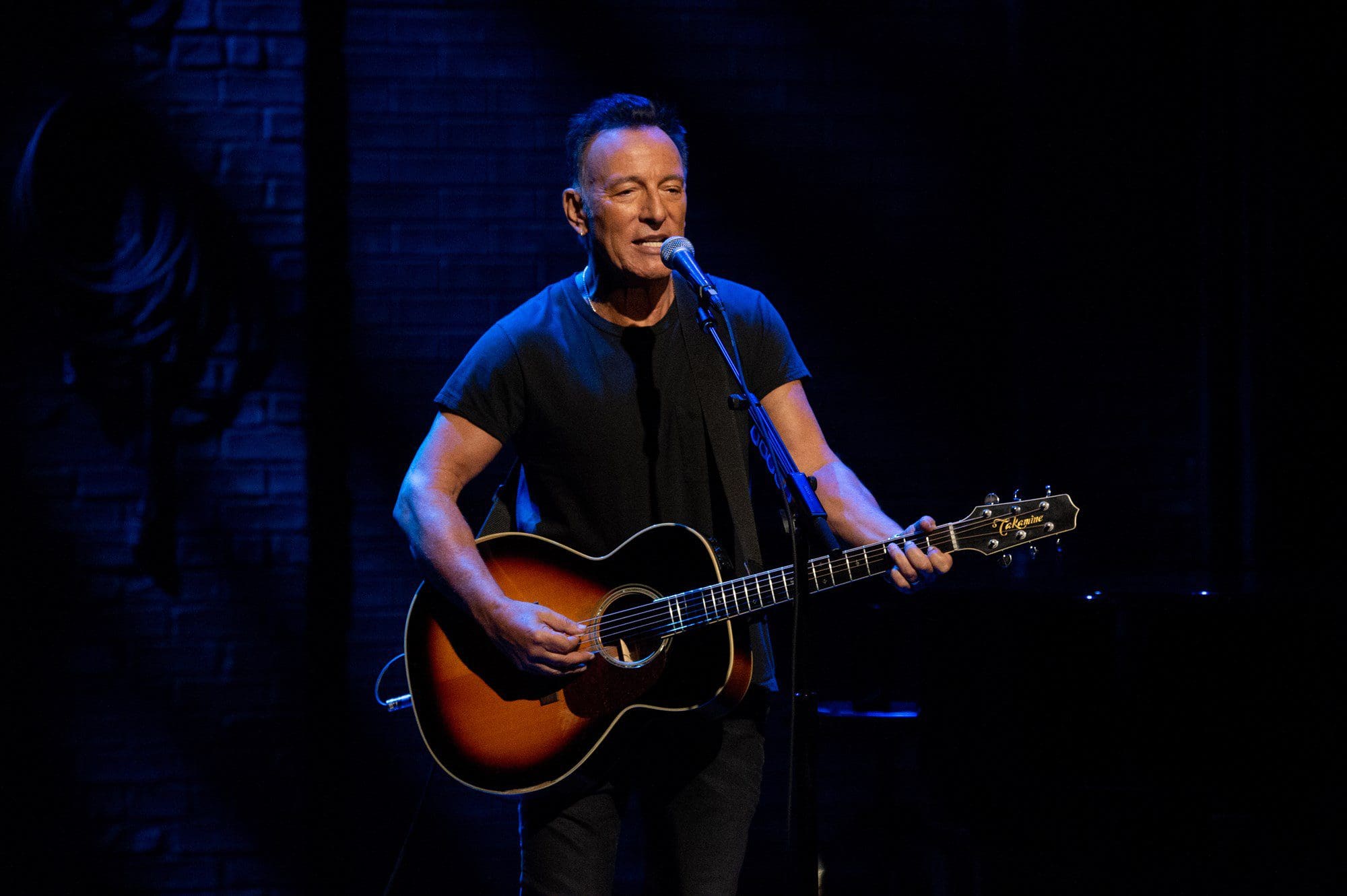
Written by Jennifer Marie
Amid laughs, Bruce Springsteen introduces his Netflix special with the claim that, in the Jersey Shore boardwalk town where he was raised, everything is tinged with a little bit of fraud — including himself.
Admittedly, he has made millions crooning about running and never looking back, while proudly living 10 minutes from his hometown. His catalogue is synonymous with the working man, but he has never worked in a factory, or even a 9-to-5. When he wrote Racing in the Street, he “had never driven a f***ing block.”
“Standing before you is someone who has become wildly successful writing about something about which he has had no personal experience. I made it all up. That’s how good I am.”
Springsteen on Broadway is a unique setting to expose the how and why of Springsteen’s career. It is a two-and-a-half-hour spoken word performance, interlaced with 15 songs — certainly a change of pace from the average 26-song, 3.5-hour arena show. It is a humorous and self-deprecating take on his chosen theme of the myth vs. the man, but ultimately validates one thing: he’s the real deal.
I watched it across two sittings, and found myself singing along, laughing and even fist-pumping on my couch. If you have read his 2016 autobiography, Born to Run, you might recognize the seeds of many of these stories. But, as ever, the live show is completely different.
The spoken word and music flow well in and out of one another, with Bruce moving from piano to guitar and back. The arrangements themselves are perfectly crafted for the solo stage, matching the richness, nuance and depth Bruce is attempting to share anew. I was surprised at how on-the-mark and yet different each one was. The fact that all 15 songs fit the acoustic set so preternaturally is a testament to their musical pedigree, and the care put into something meant to be performed night after night for 18 months.
The setlist includes many standards that fans wants to see when they pay for a seat with E Street (sorry, no ‘Rosie’), along with a select few that even diehards might not expect.
‘My Father’s House’ is introduced with a heartbreaking story of young Bruce fishing his father out of a bar. The soliloquy within the song is perhaps the deepest take on Bruce’s drive for writing about the working man and working life: “All we know about manhood is what we have seen and heard about our fathers, and my father was my hero. And my greatest foe.”
‘The Wish’ — an homage to mom — immediately follows. It’s a song from Tracks I never bothered with, but this version will be on heavy rotation for the near future. A poem played over piano, it seems as true now, about an aging mother battling Alzheimer’s, as it was in 1987 when it missed the cut for Tunnel of Love.
‘Thunder Road’ is just a bit more melancholy, heart-wrenching and hopeful than even some of the best live renditions. Sung by a man recalling the night he left Freehold, for good, laying in the back of a flatbed. “It felt absolutely wonderful. Maybe there’s nothing like that moment in your life, being young, feeling untethered from your life, your past, everything you’ve ever loved and hated.”
Bruce’s unraveling of his song selection is part of the joy of the show, so I won’t spoil the rest. But they get brighter (we are, after all, talking about the rebellious kid who went on to experience outsized adventure and success). There is solid representation from key albums: Born to Run and Born in the U.S.A; one nod each to Greetings, Tom Joad and The River, among a few others. Long-time bandmate, and wife, Patti Scialfa, joins for two songs from Tunnel of Love. Her presence feels less natural than the rest of the show, as she just lightly harmonizes on the chorus.
Springsteen does skip playing cuts from numerous — unsurprisingly Lucky Town, Magic, Devils & Dust are skipped, but the lack of songs from The Wild, The Innocent, and The E-Street Shuffle did come as a surprise.
If we are taking this performance as a living eulogy, perhaps the chosen songs are the ones that stick in his mind as defining periods for his own life. Or those that he believes should still matter in the collective consciousness.
In all, the show is not cloying or reductive. It’s patient in its telling. It gives you what you need when you need it; a skill that Bruce has perfected over decades in front of millions.
The ease with which his personal memories weave into his supposedly imagined songs is evidence of how much his truth is, in fact, reflected in his canon. So what, exactly, has he been selling? Perhaps, instead, he has given us the mythical version of ourselves, tinged with just enough truth so we can believe it.
Because at the end of the day, the stories matter most to the listener- not the teller. There were not 236 nights worth of people wanting to know Bruce better. There were 236 full houses of people searching for the answers to the questions that lead them to drive to their long-dead father’s house, remember their first love or the longing that drove them to leave the only place they never knew. That’s why he’s relevant after all these years, incarnations, and venues. And he delivers it yet again on Broadway.
Rating: 7.5 out of 10

